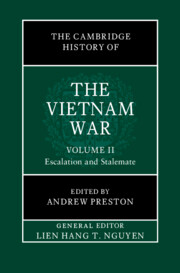Book contents
- The Cambridge History of the Vietnam War
- The Cambridge History of the Vietnam War
- The Cambridge History of the Vietnam War
- Copyright page
- Contents
- Figures
- Maps
- Tables
- Contributors to Volume II
- General Introduction
- Introduction
- Part I Battlefields
- Part II Homefronts
- Part III Global Vietnam
- 24 International Radicalism and Antiwar Protest
- 25 The Vietnam War and the Sino-Soviet Split
- 26 Western Europe and the Vietnam War
- 27 International Peace Initiatives
- 28 Japan and the Vietnam War
- 29 The Economics of the Vietnam War
- 30 Vietnam and the Global 1968
- Index
29 - The Economics of the Vietnam War
from Part III - Global Vietnam
Published online by Cambridge University Press: 02 January 2025
- The Cambridge History of the Vietnam War
- The Cambridge History of the Vietnam War
- The Cambridge History of the Vietnam War
- Copyright page
- Contents
- Figures
- Maps
- Tables
- Contributors to Volume II
- General Introduction
- Introduction
- Part I Battlefields
- Part II Homefronts
- Part III Global Vietnam
- 24 International Radicalism and Antiwar Protest
- 25 The Vietnam War and the Sino-Soviet Split
- 26 Western Europe and the Vietnam War
- 27 International Peace Initiatives
- 28 Japan and the Vietnam War
- 29 The Economics of the Vietnam War
- 30 Vietnam and the Global 1968
- Index
Summary
This chapter situates the economic history of the Vietnam War in global context. Beginning in the colonial era, it situates the wars origins in relation to the extractive logic of French colonization. But the United States acted in Indochina for different motivations. Animated by geopolitical fears more than acquisitive purposes, US policymakers pumped economic resources into Vietnam from the early 1950s, wreaking devastation in the process. The war was asymmetric, but the resources Washington committed were sufficient to destabilize the US economy, hastening the end of the postwar boom. For all its might, the United States failed to subdue the communist insurgency in South Vietnam. Instead, Soviet and Chinese resource flows and Hanois highly effective war mobilization sustained the communist war effort against improbable odds. But solutions that proved effective at waging war proved less effective in the production of peacetime growth. After 1975, Vietnam stagnated. A decade of economic failure prompted the Vietnamese Workers Party to mobilize the defeated Souths experience with global capitalism from the mid-1980s as a resource that could inform Vietnams reengagement with the world economy and the United States.
- Type
- Chapter
- Information
- The Cambridge History of the Vietnam War , pp. 625 - 647Publisher: Cambridge University PressPrint publication year: 2024

